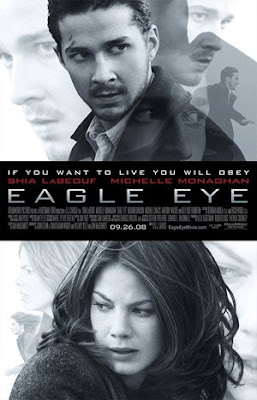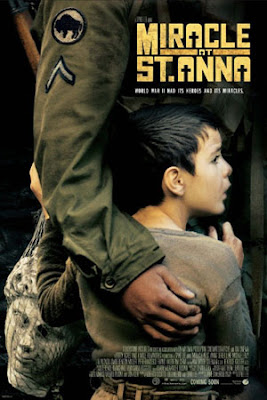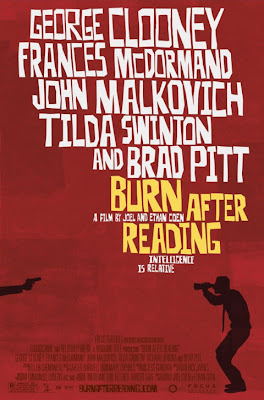 Big Brotherly Love
Big Brotherly LoveThe term "event movie" is not something that has just been presented to movie-going audiences. They've been around ever since the three-hour plus Gone with the Wind came to audiences and attempted to thrill them with a sheer grand scale and great spectacle of the visuals. Since then, movies continuously aim for that type of class, always wanting the audiences to fall in love with the scale. Sometimes, however, that gets in the way of some other minor details, like, oh say, the plot. Such is the case with this film, an absurd presentation that still manages to keep you in your seat for its entire duration.
After the film's obligatory opening shot of an attack on a possible terrorist unit in the Middle East, the film opens on Jerry Shaw, played by new hot talent Shia LaBeouf. Jerry is an average Chicagoan (our city has been showing up a lot in films this year) who has traveled the world to "find himself" along with finding debts, family tensions and a low paying job. One day, he finds his bank account filled up and his apartment stocked with weapons and military equipment. Then, a voice from a call tells Jerry to run. He doesn't, and he's captured by the FBI and interrogated by agents trying to figure out what's going on (Rosario Dawson, Billy Bob Thornton). However, the voice has more in store for Jerry and plans an escape for him. That leads him to Rachel (Michelle Monaghan), another unfortunate victim of the caller who goes on the wild trip with Jerry as they are being moved around like pawns.
The film is a classic example of how the seed of a story is better than the actual execution. In the world we live in today, the idea of an overly invasive government not only peering, but controlling everything is an interesting thought. However, the film wants us to believe that the events are to be taken with a scent of realism. The government may be big, but it isn't as organized as this film portrays it as. That idea, plus territory from 2001 where technology backfires on its creators, is not anything original (director D.J. Caruso already knows about unoriginal ideas from Disturbia). However, I do give Caruso credit for knowing how to film some really interesting, if a tab implausible, chase sequences, despite a background that doesn't support him.
LaBeouf is the go-to-guy right now for films, and he is a very good actor. I am still waiting, however, for a role from him that will convince me he is a great one. I believe he has the capability, but a role that is essentially the grown-up version of his part in last year's mega-hit Transformers is not really letting me believe otherwise. The film also suffers from the two leads having absolutely no chemistry with each other, despite some good acting. The character actors in the background are also good (Michael Chiklis is terribly miscast as the Secretary of Defense), but they take a backseat to the film's fast paced plot.
This movie has flaws in it, but it still manages to keep you going. That is until about the last twenty minutes of the film, when every twist becomes completely predictable, and the ending chooses an onslaught of cliches and cop outs that had they been installed earlier would have left audiences jeering more than they would. But, taken for what the film is, it is a very worthy treat to audiences, even if the event might just be to finish your large tub of popcorn. *** / ****; GRADE: B
 Why We Fight
Why We FightIt would be nice to preface this review with a little story, something that seemed little at first and then quickly grew into something bigger than it actually was. It started on a cool day in France during the Cannes film festival, where Spike Lee, in an obvious ploy to promote this film, attacked Clint Eastwood's films Flags of Our Fathers and Letters from Iwo Jima for failing to include any black soldiers, despite that fact that the army was still segregated at this time. This prompted a war of words between the two filmmakers, with Lee proclaiming Clint was an "angry old man" and insinuated that he was a possible racist, and Clint simply say a guy like Lee should "shut his face." That brief war between the two was more exciting, and mysterious, than Lee's actual film, which is very ambitious, maybe a bit too much, but has enough passion running through it where you can see the importance it wants to convey.
The movie, which is based off of the James McBride novel, opens with a postal service worker who, without any provocation, pulls out a Luger and shots a customer point blank range. While institutionalized in a mental hospital, a reporter (Joseph Gordon-Levitt) goes in to interview the man. This sets into motion a flashback, which tells the true story of the Buffalo Soldiers, an all black regiment during World War II sent to fight Germans in occupied Italy. Among the chief players are the overbearing and collective staff Sargent (Derek Luke), the wild, flirtatious skirt chasing sergfent (Michael Ealy), the overtly religious and eagerly excitable private (Omar Benson Miller) and the calm and intellectual corporal (Laz Alonso). After their regiment is ambushed by a German army near a river bank, the groups heads into a civilian town to rest. They are also joined by the head of a priceless statue, and a little boy that was found nearly dead, Angelo (Matteo Sciabordi). In the town, there is already a presence of the surrounding enemies, and not only is the threat of these American soldiers possibly turning, but a renegade group has also hidden in the town. To make matters worse, there is a constant supernatural undercurrent as Angelo says he is getting messages from an unseen person.
This is Spike Lee's most ambitious film to date, and it is unlikely that this is like anything he has ever made before. You can see all of the passion and respect that Lee puts into this film. This is obviously a story that is very important, and Lee uses his talents as a very gifted filmmaker to portray that. Sometimes, it does work. Other times, the canvass is too broad, and all the messages can be lost within the sea of stories. That is also another major fault of the film: there are too many characters, subplots and stories going on here that it seems impossible to tell what the movie wants to be about. The battle scenes are intense, but most of them fail to have a sense of realism, and you get the feeling that you're watching a re-enactment on a movie set instead of the real thing. The film also has some of the most eccentric editing is used, but Lee's collaboration with composer Terrence Blanchard is always an irritating one. Blanchard's scores are not lacking in quality, but they never fit the moment on the screen. It's a trend of Lee's that has infuriated me because the music constantly distracts from the essence of the story.
I also didn't much care for the characters in this film, which is unusual considering that is generally the strong point in Lee's films. Every person is of predictable caliber and never offers anything new to the film. In fact, the characters played by Ealy and Miller seem like stereotypes of the long ago era that portrayed black men as either jolly, dancing grinners or sex craved offenders whose only goal was to sleep with white women. I don't know why Lee chose to have these characters act this way, especially when he has spent a lifetime of trying to demonize those images. All the actors are good in their respective roles, but they never excite the film. The only truly great performer is that of Sciabordi. He is the only one that keeps a sense of mystery in the film, which is an element it desperately needed. He has a natural love of the camera, and is the best thing in it. There are also good performances from from those in the framing device, such as John Tuturro, John Leguizamo, and Gordon-Levitt, who is the best of them all, but is unfortunately wasted in a segment with not much use.
I was all for this film until a certain scene came on. It was another flashback, within the flashback, that showed the black soldiers being refused service at an ice cream parlor, even though German POWs were allowed to eat there. The manager pulls a gun, makes several derogatory remarks, and explains to his young son that is the only way to treat black people. It's an engaging scene, but completely unnecessary. The point of racism is already inherit in the story, and there's no need to put a scene like that here to emphasize that point, especially when several characters argue against it. Still, I recommend the film on the sole notion of the passion that is involved. Sometimes, you have to admire the deep seeded respect the filmmakers have for a subject even if the execution is flawed. I saw that a couple years ago with Emilo Estevez's Bobby and Lee has provided the same type of film here. You might get a different take if you ask Clint Eastwood, but I'd say there's probably more passion here than realized, if only it were about a half an hour shorter. *** / ****; GRADE: B



